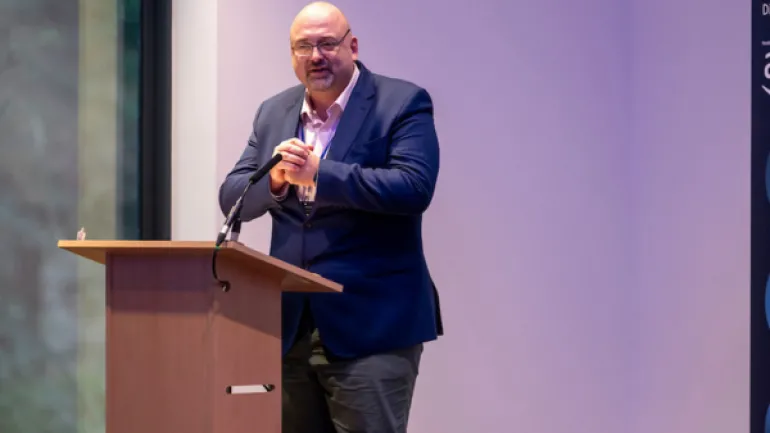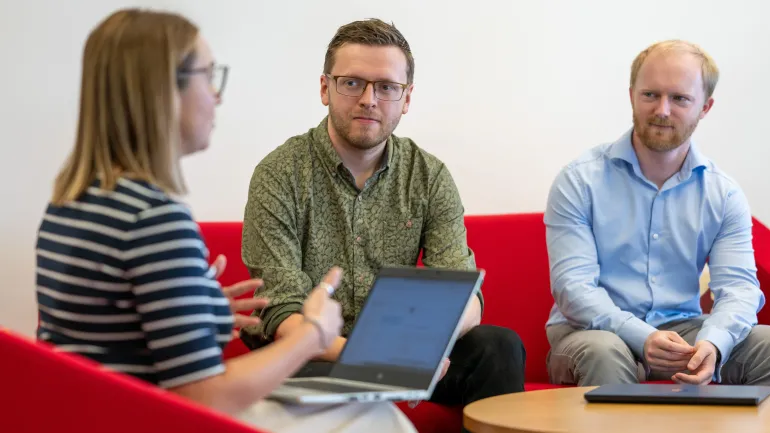The AI Commission Digging Deeper conference was the first of its kind in Wales, bringing together professionals, academics, clinicians, and industry leaders, to explore the evolving role of Artificial Intelligence (AI).
Throughout the day, discussions focussed on how AI can and is being harnessed to improve lives, enhance healthcare, and ensure ethical, transparent, and inclusive implementation. Setting the tone for the day, host and moderator Sian Lloyd emphasised:
“We hear a lot about AI, but we don’t always see the change in our everyday experiences – especially in health and social care. Today is about thinking critically about AI innovations and how they fit within your spheres.”
Minister Sarah Murphy’s address
Sarah Murphy, Minister for Mental Health and Wellbeing, delivered a passionate address, celebrating Wales’ strides in AI-driven healthcare.
“AI-assisted stroke diagnosis is available in all parts of Wales. It is supporting the faster diagnosis of prostate and breast cancer, and is integrated into our National Data Resource, ensuring we bring the benefits of technology to the 3 million people we serve.”
Sarah stressed that while Wales must not only foster innovation, but AI’s implementation should align with social partnership values. A key message throughout the day was reassuring the public and workforce that AI supports jobs rather than threatens them.
“As AI becomes more ingrained in our way of life, it’s important that employees and employers are part of that journey, so that everyone benefits from ongoing innovation and progress. AI must be transparent, ethical, and trustworthy. It should be inclusive and accessible, designed to support, and augment roles, not replace our workforce.”
Sarah concluded with a powerful call for collaboration:
“Together, we can improve lives and improve services. But this future must be shaped with care, ensuring the principles of safety, fairness, and ethical responsibility are at the heart of every decision we make. The possibilities are limitless, and by working together, we can ensure that AI is a force for good, for all.”
Building public trust in AI
A central theme of the conference was the importance of ethical AI deployment and public trust. Discussions emphasised the need for confidentiality, transparency, and to take the public with us on the journey, ensuring they’re actively engaged in AI’s development.
Across the board, particularly in healthcare, AI continues to be transformative. One example is Betsi Cadwaladr University Health Board’s Prostate Cancer early detection programme with AI, which leverages AI-driven imaging data to improve the speed and accuracy of diagnosis.
Ian Hulme, Director of Regulatory Assurance, Information Commissioner’s Office, addressed public concerns:
“There’s an inherent fear around AI, that the ‘robots will take over’. But it’s essential we focus on transparency, accountability and building public confidence.”
This set the tone, that the conversation isn’t about fearing AI, it’s about how we responsibly integrate it to create a better future for all.
AI as an assistive, not replacing force
Mike Emery, Director for Digital and Technology, Welsh Government and Chief Digital Officer, provided a compelling perspective on AI’s role in enhancing, rather than replacing human functions. He acknowledged that public fears of ‘AI taking over’ are often shaped by dystopian films and media, highlighting the need to showcase AI’s real-world benefits.
“It’s designed to assist and improve human activities, not replace them. But the need, as the minister said, we must establish ethical guidelines to build greater trust in how AI is deployed.”
Mike also shared a deeply personal story about his daughter’s experience with AI-powered assistive technologies, that’s already making a difference to her life.
“The technology is exciting, but we must remember why we’re doing this, to make a difference in people’s lives. Think of your own families and the people around you. Let that be your North Star when developing AI solutions. Hold on to that, when thinking about what AI can do – changing outcomes for people for the better, improving people’s lives, using AI to maintain our humanity, and how we approach care and not lose it.”
AI’s impact on workforce efficiency
Another key discussion centred on how AI can alleviate administrative burdens and streamline healthcare processes. In the session, ‘Advances in AI’, speakers emphasised AI’s potential to create efficiencies.
Jacob West, Managing Director, Microsoft UK, highlighted how AI-driven tools like Microsoft 365 CoPilot, are augmenting areas within the working day.
“We’re seeing over 30-40 minutes a day saved time for healthcare workers – in a wider perspective that’s 2-3 weeks of work within a year.”
“A junior doctor’s discharge process, which currently takes around 15 minutes, could be reduced to just 2 minutes with AI support. Think of the time that’s saving across an entire hospital.”
Similarly, the integration of AI-powered assistants could significantly improve workflow efficiency, freeing healthcare professionals to focus more on patient care.
Diane Gutiw, Vice President AI Research Center Lead, CGI, discussed the opportunity of AI, seeing more personalised treatments, transcribing, and access to care – allowing people in the care system at home for longer.
“Although no one is going to be as empathetic as us as humans, we can strengthen our abilities and efficiency, whilst giving people greater independence.”
Diane also discussed the role of AI in early cancer detection:
“AI allows us to detect patterns and anomalies that might not be visible to the human eye. From imaging analysis to predicting patient risks, it’s a game-changer for diagnostics”
Upskilling the workforce for an AI future
As AI reshapes workforce efficiency, there was a strong call to upskill both today's and future workforce.
Dr James Peake, Senior Vice President, CGI, emphasised that investment in workforce is just as vital as investing in technology.
“We can’t just spend on technology. We must also understand organisational barriers and invest in our people’s skills. If budget, or motivation are the barriers, AI alone won’t solve that, AI is a tool to support solutions. Technology is important, although imagination and discipline to applying the technology is going to be key.”
In summary, the conference was a thought-provoking forum for discussing AI’s potential, challenges, and future direction. While AI’s potential is vast, speakers and panellists reiterated that its success depends on ethical deployment, trust-building, and human-centric implementation. As Mike Emery emphasised:
“The potential is there, but if we’re not at the forefront, we’re doing a disservice to our communities.”
By fostering collaboration, embracing ethical frameworks, and equipping the workforce with the right skills, AI can become a force for good, transforming healthcare and society that are both meaningful and responsible.
Stay connected, share your insights, and be part of this evolving landscape.
If you’d like to stay updated on AI in health and social care, please email hello@lshubwales.com to sign up to the AI Commission newsletter.





